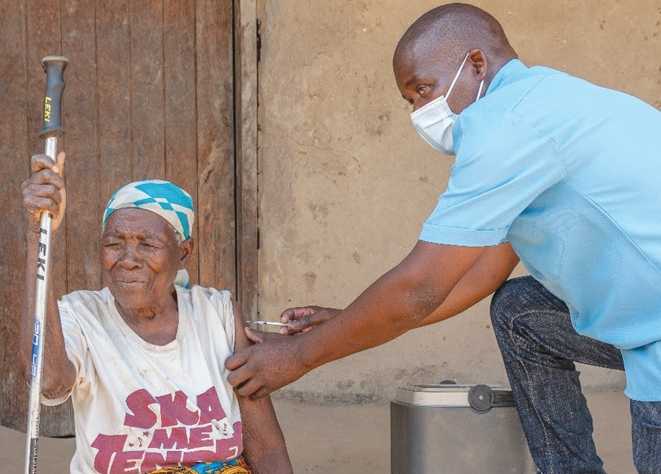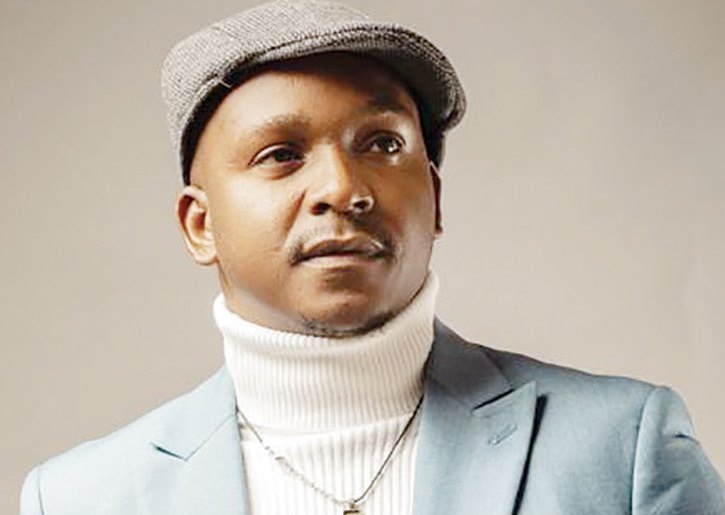Thomas Mgundo, 84, feared for his life every time he heard that Covid-19 mostly kills the elderly and people with chronic conditions.
“I often asked myself: Will I survive if Covid-19 vaccines do not come? However, there wasn’t much I could do to protect myself,” says the man tucked in Nikisi Village, almost 11 kilometres south of Mwanza Town.
The hypertensive octogenarian suffered stroke in 2013, a year after he fell blind. The aftermath of high blood pressure paralysed his left side, including his left ear and limbs.
The chronic condition left him immobilised and in no doubt of his vulnerability to Covid-19, which has claimed about 2 500 lives from Malawi’s 83 300 confirmed cases.
“For nine years, I cannot walk, I can’t see, I can’t work and I can’t hear clearly. I couldn’t afford a motorcycle ride to get vaccinated at Tulonkhondo Health Centre, a five-kilometre trip worth K1 000 one way,” he explains.
The grandfather of almost 40 is among 39 elderly Nikisi villagers vaccinated in their homes by mobile health workers supported by the European Union through Save the Children.
Since June, the health surveillance assistants (HSAs) have been going door-to-door in eight districts to increase access to Covid-19 vaccines.
Mgundo feels safer after receiving the single-dose Johnson & Johnson vaccine in September.
“I got vaccinated because I hear on the radio that Covid-19 is deadly, especially for the elderly and those with conditions like mine, but those vaccinated rarely get severely ill or die,” he narrates.
Mgundo was glad to get vaccinated at his doorstep.
“I didn’t experience any hardships. Previously, I wasn’t sure if the vaccine would reach me. With my condition, I couldn’t go to the nearest health facility,” he explains.
The man is among 762 200 fully vaccinated Malawians. About 363 100 have received the single-dose Johnson & Johnson vaccine while 400 000 got two doses of AstraZeneca.
Some 1.1 million have received the first dose of AstraZeneca and 1800 the initial Pfizer jab.
Taking vaccines to hard-to-reach communities and at-risk populations has increased the uptake from three to 6.5 percent of people aged 18 and above.
The Ministry of Health reports that mobile vaccination teams helped utilise 714 000 doses within two months.
This saved the doses that were expected to expire last November and December as well as lives amid the highly contagious fourth Covid-19 wave.
Mgundo now faces the future with hope.
“The health workers assured me that the vaccine will neutralise the virus from causing life-threatening illness if it enters my body,” he says.
He discredits the myths and misinformation slowing Covid-19 vaccination as “merely fear of the unknown”.
He explains: “Vaccines protect us from preventable diseases. I was immunised against measles in the 1940s, but it didn’t harm my body. Up to now, I have never suffered from measles or any effects of that jab. I haven’t even experienced fever since I took the Covid vaccine four months ago.”
Tamandani Kuchanje, environmental health officer from Mwanza District Health Office, spoke of rising vaccination rates, with 48 percent of adults in Nikisi vaccinated.
The mobile vaccinators reach up to 116 a day, up from just 10 to 20 when they were confined to health facilities that are far apart.
Kuchanje states: “The outreach takes vaccines to people and areas that we couldn’t reach if the vaccines were restricted to health facilities only.
“Before the door-to-door strategy, people found it hard to travel to health centres or take a break from their farm chores just to get vaccinated.”
For him, vaccinating the elderly shows “we value the senior citizens as custodians of our cultural heritage.”
The roving vaccinators also target community meeting points. They are backed by trained community-based theatre groups that attract crowds and spread accurate messages about Covid-19 and the vaccine.
Village head Nikisi rallies her community to get vaccinated and ensure the most vulnerable are not left behind.
“With this initiative, almost half of eligible people in my village have been vaccinated. This includes all 34 elderly people and five others who might have taken advantage of this intervention while visiting their grandchildren,” she explains.
A coalition of nine international non-governmental organisations has rolled out the campaign in aid of government’s goal to vaccinate 30 percent of eligible grown-ups. Save the Children leads inroads in Mwanza, Mulanje, Mangochi and Blantyre in partnership with Goal Malawi, Care International and Trocaire. Coopi leads inroads in Dowa, Dedza, Lilongwe and Mzimba.
“We are still a long way, but the communities reached by the outreach teams are recording high vaccination rates. Some have surpassed the national targets, with over 80 percent vaccinated,” says Save the Children campaigns and communications manager Laurent Kumchenga.
The post ‘We value senior citizens’ appeared first on The Nation Online.
 Moni Malawi
Moni Malawi 

